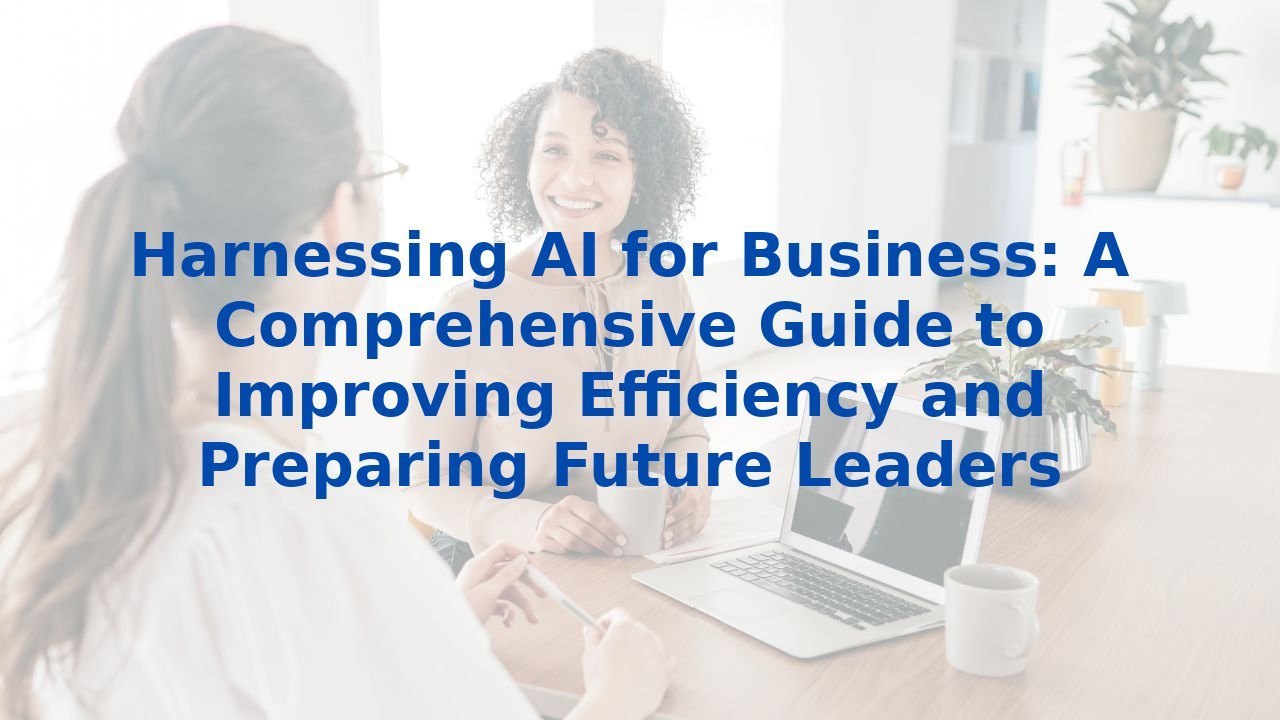Harnessing AI for Business: A Comprehensive Guide to Improving Efficiency and Preparing Future Leaders
Harnessing AI for Business: A Comprehensive Guide to Improving Efficiency and Preparing Future Leaders
In the ever-evolving landscape of business, efficiency is not merely an objective—it's a necessity for survival. Organizations that succeed in this race not only embrace change but actively leverage powerful tools like Artificial Intelligence (AI). This guide will illuminate how AI can enhance various business processes, improve efficiency, and prepare future leaders for the challenges that lie ahead.
1. Automation of Repetitive Tasks
Repetitive tasks can be a productivity drain. From mundane data entry to routine customer inquiries, such tasks consume time that could be better spent on strategic initiatives or creative endeavors. The beauty of AI lies in its ability to automate these tasks, liberating your workforce from the mundane.
For instance, consider the rise of chatbots in customer service. These AI-powered assistants seamlessly handle a significant volume of inquiries, leading to faster response times and a noticeable improvement in customer experience. This shift not only enhances satisfaction but also allows human representatives to focus on complex issues that require a personal touch.
2. Data Analysis and Insights
In an age characterized by information overload, AI shines in its ability to sift through massive datasets and unearth valuable insights. This capability enables organizations to make informed decisions that can propel their business forward.
Imagine the possibilities when AI analyzes customer data to craft tailored marketing campaigns or identifies market trends before they emerge. With data at their fingertips, businesses can pivot strategies in real-time, ultimately leading to more effective outcomes.
3. Efficiency and Productivity Gains
One of AI's most significant contributions is its ability to achieve efficiency and productivity levels that surpass human capabilities. By automating repetitive, time-consuming tasks, employees are freed to engage in higher-level thinking and creative problem-solving—areas where humans excel.
For instance, in software development, AI can generate test data, allowing developers to devote their time to crafting innovative solutions, rather than getting bogged down in the minutiae. Emphasizing efficiency leads to increased productivity and a more motivated workforce.
4. Improved Speed of Business
Time is money, and AI is a time-saving powerhouse. By optimizing business processes, AI can expedite cycles and facilitate smoother transitions between phases. This is particularly evident when transforming product concepts into market-ready solutions.
Accelerated processes translate to measurable ROI, making room for rapid adaptation to market demands. Businesses that harness this speed are well-positioned to exploit fleeting opportunities—setting themselves apart in competitive landscapes.
5. Process Optimization and Error Reduction
The incisiveness of AI extends to improving process efficiency and eliminating human errors that can be costly. In hiring, for example, AI can streamline initial candidate assessments and automate resume screening, freeing up HR professionals to focus on critical human-centric aspects of recruitment.
Moreover, AI's ability to mitigate human error is invaluable. Whether in financial accounting or data management, these enhancements can significantly reduce risk and increase reliability across the organization.
6. Personalization and Customer Insights
In a world where consumer expectations are constantly evolving, personalization is no longer just a nice-to-have—it’s essential. AI excels in analyzing behavior patterns and preferences, allowing businesses to offer tailored experiences to customers and employees alike.
For example, discerning customer sentiment through social media data can inform not only marketing strategies but also product development initiatives. The insight gained from AI analytics becomes a roadmap for creating exceptional experiences.
The Benefits of Training Employees for AI
It's essential to remember that the true potential of AI can only be realized through skilled human intervention. Training employees to utilize AI tools is key to maximizing these benefits. Skill enhancement is a noteworthy advantage. When employees are trained, their confidence and efficiency increase, enabling them to work in harmony with AI systems.
Furthermore, adaptability becomes second nature for trained employees, allowing them to navigate the continuously evolving technological landscape with ease. As AI continues to advance, this resilience becomes a critical asset for organizations.
Perhaps most importantly, trained employees are empowered to integrate AI into strategic decision-making processes. They are equipped to utilize predictive analytics and other insights, resulting in informed, data-driven strategies that will propel your business forward.
Conclusion
The integration of AI into business operations is no longer optional—it’s a strategic imperative. By automating mundane tasks, enhancing data analysis, and optimizing processes, AI reshapes how organizations function. Training employees in AI may seem like an extra step, but it’s an investment in your organization’s future, ensuring your workforce is prepared to lead in this tech-driven era.
As we move forward in this interconnected landscape, let’s embrace AI, tailor our training programs, and cultivate leaders who are agile, innovative, and ready to harness the boundless potential that technology offers.
For organizations ready to take the next step in AI training, consider exploring options that equip your entire workforce with the necessary skills to thrive in this exciting new world.



